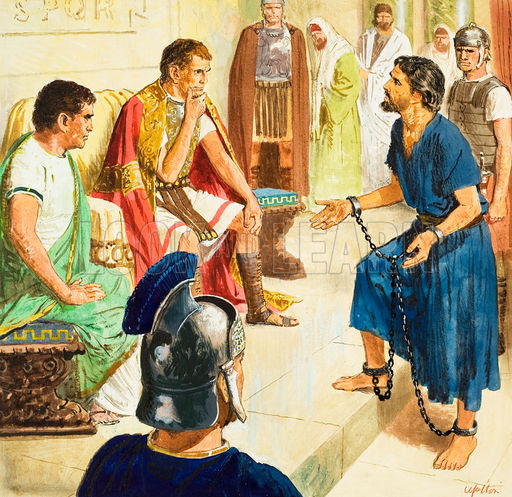How did Jesus, the Supreme Commander of the Universe, relate to those in power while He lived on earth? Although His encounters were most often with the religious leaders, how are we to minister to those in authority, both in the religious and the political world?
As shy as some of us are, it’s hard to imagine ourselves witnessing before powerfully influential people, like Jesus and Paul did. But our lesson pointed out that although neither one of these Bible examples sought out the opportunity to stand before these individuals in power, they did not shrink from that responsibility either. And special power and grace was given to them just when it was needed. We don’t have to worry about having the courage now. The Holy Spirit will give us all the right words. (Matthew 10:18-20: “…it shall be given you in that same hour what ye shall speak…” KJV)
Memory Text: “The word of God continued to spread; the number of the disciples increased greatly in Jerusalem, and a great many of the priests became obedient to the faith.” Acts 6:7 NRSV
The result of Jesus’ interactions with the religious leaders did not appear to be very fruitful at the time. But evidently many of them, not just SOME of them, changed their tune after Jesus was gone. How encouraging this should be to us, as we witness to those in power. We can sow the seed. But the harvest is in God’s hands.
Sunday: Respecting Authority
Romans 13:1-7 gives the overall impression that we should do all we can to remain law-abiding citizens of whatever government we live under. And of course, this is always the best action to take, in order to best reach those in power with the gospel and to be an example for other citizens.
After all, even though the Roman Empire brutally terrorized those under its power, Jesus never exhibited any desire to rebel against that government. On the contrary, Jesus even paid them taxes, an example set by Joseph and Mary when they went to Bethlehem to become registered taxpayers. All of these events, however, worked out to fulfill God’s will in the end.
Perhaps this is why Paul refers to kingdoms and governments as ordained of God. Paul repeats this admonition to the Hebrews in chapter 13:17 when he says, “Obey those who rule over you, and be submissive…” NKJV. Jesus Himself said to Pilate, “Thou could have no power at all against me unless it had been given you from above…” John 19:11 NKJV God evidently does “ordain”, or “set, appoint, establish” leaders in power.
There are times when governments must be disobeyed, however. Peter and John were commanded not to teach or preach in the name of Jesus. Obviously, that command was not obeyed (Acts 4:18-19). And Daniel’s friends, who were thrown in the fiery furnace in the Old Testament story, remind us that commands that directly interfere with keeping the Ten Commandments should not be obeyed. Daniel was even thrown to the lions because he disobeyed the king’s command not to pray to God.
Discussion Questions: Is civil disobedience or activism, as we might call it today, ever an option for Christians? What modern-day examples can you give? (for instance, civil rights movement in the sixties?)
Should people always obey their governments? (what about the Germans during Hitler’s regime?)
What cautions should we maintain though in our activism and political involvement today?
Was the overturning of the moneychangers’ tables in the temple by Jesus an act of civil disobedience, or maybe religious disobedience?
How can we show respect to those in authority, even when we disagree with their policies?
Monday: “Have You Not Read…?”
In the interest of avoiding conflict and argument, Jesus often simply referred the priests and rulers to the Scriptures themselves when they approached Him with difficult questions. His calm reply usually began with “Have ye not read…?”
Their bitter hatred appeared to cloud their ability to grasp His deeper meanings of the law, but it didn’t deter our Lord from sharing the gospel of salvation with them. Knowing as He did that they were the very ones who would one day have Him executed makes us stand in awe of His amazing grace and patience with this group of proud, selfish men.
Discussion Questions: Are we at times so protective of some cherished belief that we close ourselves off to more spiritual light? What doctrinal issues have become controversial topics in church circles today? [ex.: women’s ordination rights, types of worship music, etc.]
How can we be sure that our hearts and minds aren’t as hard and blind as the Pharisees and priests in Jesus’ day? How can we deal with our differences in a way that keeps us united?
Tuesday: The Centurion
The centurion, who came to Jesus to ask for healing for his servant, ended up teaching the disciples an important lesson about their own faith and discipleship goals. The account comes to us from two disciples: in Matthew 8:5-13 and Luke 7:1-10, and it must have made quite an impression on all of them.
Even Jesus was impressed: “When Jesus heard these things, he marvelled at him, and turned him about, and said unto the people that followed him, I say unto you, I have not found so great faith , no, not in Israel.” Luke 7:9 KJV
The centurion, in a humble manner, pleads with Jesus to just say the word and he knows his servant can be healed. This must have truly amazed the surrounding throng as well. Hearing such a deep, living faith expressed by a Gentile convert must have been very inspiring to all in the crowd that day.
How blown away would we be if someone rich and powerful and famous today came forward and made a public declaration of his or her faith, especially if it was our own denomination’s faith?…
- Would we be somewhat hesitant to accept the sincerity of his witness?
- Would we question whether she had acquired enough doctrinal background to make an intelligent decision for God?
- Just how well would we be able to assimilate such a person into our local congregation and make him feel welcome and loved?
Discussion Questions: What character traits did this centurion possess?
How might he have been converted in the first place? Who might have been the one reaching out to him? Could it have been the sick servant?
Wednesday: Judgment Day
How Jesus would have rejoiced had the powerful priests and kings repented during those final scenes of His trial and death! Jesus had invested much time trying to reach the religious leaders. And yet it was Pilate, a secular ruler, who appeared closest to accepting Jesus as Messiah. (Read the exchange with him in John 18:33-38.)
Jesus’ methods of witnessing mirrored the same style used for the general populace. It involved:
- meeting and sympathizing with them (they were never turned away)
- ministering to them (He continued to point them to salvation through Scripture references and thought-provoking stories)
- trying to win their confidence (the final object of His efforts, especially in those last hours of His life)
In standing before these powerful rulers both Jesus and Paul:
- were respectful in their manner,
- considerate of their audience, and
- clear and concise in their words.
Discussion Question: Although we may never be called upon to witness to powerful people in a trial setting, we may have the opportunity to witness in other circumstances–an airport or social gathering, for instance. If this were to happen to you, how would you respond to the question, “So, what do Seventh-day Adventists believe?”
Thursday: The Early Explosion
Considering the masses of people Jesus came in contact with during His public ministry and the amazing physical signs both before and after the crucifixion, it shouldn’t surprise us that the early church grew by leaps and bounds in its beginning. We can only assume that most of these new converts were fence-sitters, waiting for circumstances to enable them to make the dramatic move to the Lord’s side.
Jesus’ resurrection tore down those fences or barriers that were preventing some from publicly declaring their allegiance with the King of Kings. Unfortunately, most of the secular leaders seemed to have rejected forever the call to be disciples. But we are encouraged by the fallout of witnessing before these powerful people. The result is often most pronounced with those who are near to the one in power. As Paul indicated many times in his letters to the churches:
“So that my bonds in Christ are manifest in all the palace, and in all other places;” Philippians 1:13 KJV
Discussion Questions: How is our discipleship success measured? By the number of people who hear us or by the number who respond? Or perhaps something else?
Discuss why the public ministries of Joseph (Gen. 41:43) and Daniel (Dan. 2:48) were successful and who benefited from their faithful service.
Are you an “up-front” or a “behind-the-scenes” person in your discipleship efforts? How are both styles effective in wining souls?
Summary: In our culture, celebrity is extremely valued. Whether it be those in sports, the entertainment industry, or politicians, there is the tendency to feel rather insignificant in their presence. But we have an important message to share and we should not hesitate to make the most of even the briefest encounter with someone in a powerful position. Keeping in tune with the Holy Spirit’s promptings is our best guarantee of having the right words to speak at the best time for an exchange. Do not be afraid or discouraged by the result, however. God is willing to speak through us and be responsible for the response.
Challenge: If the Holy Spirit is prompting you to do so, there are some avenues that perhaps you haven’t considered for witnessing to the powerful. It doesn’t have to be a face-to-face encounter. We can reach them in many ways:
- There is a magazine called “Liberty” that focuses on religious liberty around the world and is tailored to those leaders in all areas of government, judicial departments, law schools, and all professionals interested in this topic. You can help reach these influential persons by paying for their subscription. Contact your local Seventh-day Adventist church for more information.
- You might feel comfortable writing an occasional letter to the editor of your local newspaper, commending public officials about their support of some issue or to challenge others to be concerned about a matter of public safety. Christians should be known as those who want to contribute positively to their communities.
- Work on developing an “elevator speech” to take advantage of quick exchanges with powerful figures or just anyone you might be seeing only briefly. The average attention span in these situations is only 30 seconds long, so keep your message under a minute. Your pitch should be brief, targeted, visual, and should sound unrehearsed. Perhaps a short story, with some kind of hook at the end. No matter what you prepare though, prayerfully be ready to deliver whatever the Lord has for you to say.
- Social media, including blogging, has a positive side in that it enables us to impact a wide number and variety of individuals. Use it wisely to further God’s cause and let your light shine to the world.
- By all means, pray fervently for the leaders of the world. The Holy Spirit can reach them when we can’t.
Next week: Discipling the Nations









